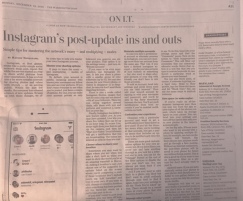
We will now see advertisements on many of our Google Image searches.
In a March 5, 2019 blog post, Google announced a new advertising promotion that will appear in Google Image searches. According to a post, written by Surojit Chatterjee, the company’s data indicate that many people who consult Google Images are actually shopping for products and looking for pictures of items they might purchase. So the company has created “shoppable ads” that will appear at the top of the image page illustrating where items can be purchased. Continue reading “Google Images Now Come With Ads!”


 According to a
According to a 


You must be logged in to post a comment.